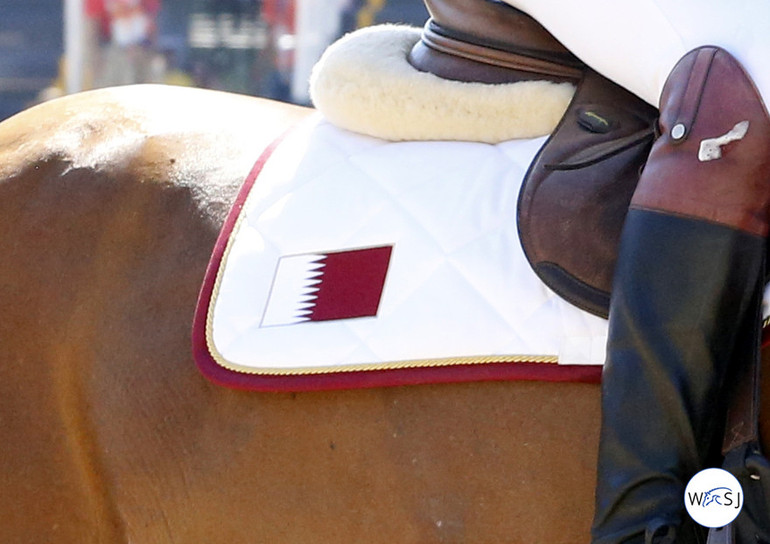Text © World of Showjumping
Earlier this week, Qatar lost its team quota place for the 2020 Olympic Games to Morocco. The reallocation was announced by the FEI, after the FEI Tribunal decided to disqualify Sheikh Ali Al Thani and Bassem Mohammed’s individual results from the Olympic qualifier held in Rabat on 13 October 2019. The two disqualifications left Qatar without a team result.
Both riders had tested positive for Carboxy-THC, a metabolite of cannabis – which is a prohibited substance under the FEI’s Anti-Doping Rules for Human Athletes (ADRHA). The samples were taken on 13 October 2019, during in-competition testing.
Cannabis is considered a specified substance, prohibited in competition under the 2019 WADA Prohibited List. The estimated concentration in the samples were 404 ng/mL for Sheikh Al Thani and 2955 ng/mL for Mohammed – over the decision limit of 180 ng/mL. The Qatari athletes claimed that the positive tests were a result of tampering.
In January this year, the FEI asked for automatic disqualification of the two athletes’ results – in accordance with ADRHA article 9.1. As the 17 February was FEI’s deadline to confirm quota places to national federations, a partial decision on the matter was requested – and granted by the Tribunal.
To the Tribunal, the FEI argued that: “The rule applies regardless if the period of Ineligibility is reduced or eliminated under Article 10 ADRHA, e.g., on the basis of No (or No Significant) Fault or Negligence, no matter the explanations for the positive finding, since the Athlete did compete with a prohibited substance in his body in this competition. The quick application of the automatic disqualification is necessary in order to safeguard the level playing field of equestrian sport.” By the Court of Arbitration for Sport (CAS) this is referred to as the principle of “Strict Liability”.
On 15 February 2020, the FEI Tribunal issued a partial decision. As to the disqualifications, the Tribunal pointed out that it does not matter whether or not the prohibited substance has had any performance enhancing effect: “Carboxy-THC has been included on the 2019 WADA Prohibited List, and as such any positive finding of a listed substance, is prohibited,” reads the decisions.
To the FEI Tribunal, the two Qatari athletes argued that Moroccan cannabis had been deliberately added to the shisha they had been smoking in the bar of their hotel. The athletes said shisha smoking is very popular in Qatar and particularly common for professional athletes in order to relax. “While shisha was also popular in Morocco, a substance named “kif”, i.e., the Moroccan cannabis was often used instead of or with the shisha tobacco, unlike in Qatar,” the athletes explained to the Tribunal.
However, the athletes said that the Qatari team manager had strictly followed up and supervised the athletes – stressing that precautions were taken in order to assure that only shisha tobacco would be used in the shishas smoked by the athletes. Given the strict precautions taken by their team manager, the riders concluded to the Tribunal that the kif was deliberately added to their shisha(s). “The Team’s most important competitor in the Event was Morocco, the host nation, which if the Team was to be eliminated, would take its place at the 2020 Tokyo Olympic Games,” the athletes argued – also informing that they had filed a criminal complaint with the Moroccan authorities. The rides asked that these circumstances were to be considered “exceptional” in nature, and that the Tribunal could not eliminate the team.
The athletes also argued that the decision on elimination had to be suspended until a final decision was made on the criminal complaint in Morocco, as it was important to confirm whether they had been victims of a crime.
However, the Tribunal found that the partial decision only concerned the disqualification of the results and not the merits of the cases – pointing out that it was not fully relevant whether the explanations of sabotage might materialize over the course of the athletes’ investigation. The Tribunal stated that the decision only concerned the disqualification of results, adding that “(…) all other arguments which might not have been addressed in this Decision do not need to be decided at this point in time.”
The athletes also submitted several other procedural arguments. They said the refusal by the FEI Tribunal to hold an in-person hearing, but rather a video conference call, constituted a violation of their right to a fair trial as protected by the European Convention on Human Rights art. 6.1, and argued that the right of a professional athlete to carry out his occupation – which might be affected by disciplinary proceedings in the context of a sports federation – was without doubt a “civil right” in nature.
The FEI Tribunal’s decision can be appealed to CAS. However, there is not yet any official statement from the parties about whether or not such an appeal has been, or will be, filed.
Read the FEI Tribunal's partial decision here.









